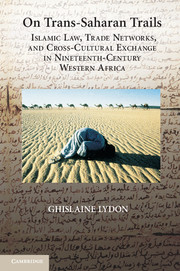 On Trans-Saharan Trails
On Trans-Saharan Trails Book contents
- Frontmatter
- Contents
- Acknowledgments
- Note on Language
- List of Abbreviations
- Glossary
- Maps
- 1 “Making History” Across the African Divide
- 2 Trans-Saharan Trade in the Longue Durée
- 3 Markets and the Movement of Caravans: Nineteenth-Century Developments
- 4 Guelmīm and the Wād Nūn Traders
- 5 The Organization of Caravan Trade
- 6 Business Practice and Legal Culture in a Paper Economy of Faith
- 7 Trade Networks and the Limits of Cooperative Behavior
- 8 On Trans-Saharan Trails
- Appendix 1 Nineteenth-Century Events
- Appendix 2 Pillaged Caravans Reported in the Chronicles
- Bibliography
- Index
3 - Markets and the Movement of Caravans: Nineteenth-Century Developments
Published online by Cambridge University Press: 02 July 2009
- Frontmatter
- Contents
- Acknowledgments
- Note on Language
- List of Abbreviations
- Glossary
- Maps
- 1 “Making History” Across the African Divide
- 2 Trans-Saharan Trade in the Longue Durée
- 3 Markets and the Movement of Caravans: Nineteenth-Century Developments
- 4 Guelmīm and the Wād Nūn Traders
- 5 The Organization of Caravan Trade
- 6 Business Practice and Legal Culture in a Paper Economy of Faith
- 7 Trade Networks and the Limits of Cooperative Behavior
- 8 On Trans-Saharan Trails
- Appendix 1 Nineteenth-Century Events
- Appendix 2 Pillaged Caravans Reported in the Chronicles
- Bibliography
- Index
Summary
The exchange of the cotton bale (bayṣa) in gold is one-and-a-half mithqāl (approx. 6.5 grams), and [the bayṣa] in silver is three ūqiya (ounces). The female slave (al-khādim) is between ten and thirteen bayṣas. The [price of ostrich] feathers is seven bayṣas … when before it was five bayṣas. And the exchange of the bayṣa in millet is eight mudds of Walāta (approx. 24 kgs). … I inform you that I sent to you [his brother in Shinqīṭi] a load of ostrich feathers with Bātin Ibn Zaydān: six ūqiya of salāṭīn (good quality, white), one-quarter of a raṭl (approx. 125 grams) of ʿayār (medium quality, white), four raṭl (approx. 2 kgs) of black feathers worth one-and-a-half mithqāl. … Be informed that a group of Rgaybāt from Guelmīm arrived here in Walāta … among them there is Ibrāhīm Wuld Aḥmad Wuld ʿAly to whom you owed a debt. … As for Buhay, he is well and currently in Timbuktu with ostrich feathers and gum arabic that he wants to forward for sale in the north (fī al-sāḥil). … Be aware that we have learned that the son [Aḥmadu al-Kabīr] of al-Ḥājj ʿUmar has joined the Christians (al-Naṣārā; i.e. the French) with numerous contingents of Futis [Fulbe]. If cloth does not arrive from their direction, it will become unavailable here.
Letter from Walāta, circa 1880Caravans were the lifelines of Saharan oasis towns. Their departures marked the yearly calendar as did their most anticipated returns.
- Type
- Chapter
- Information
- On Trans-Saharan TrailsIslamic Law, Trade Networks, and Cross-Cultural Exchange in Nineteenth-Century Western Africa, pp. 107 - 159Publisher: Cambridge University PressPrint publication year: 2009


